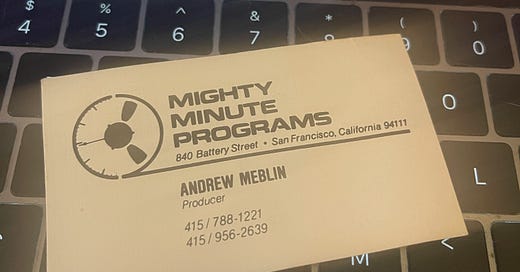Editing
By Andrew Meblin
Freddie deBoer’s Substack article about Paul Krugman’s leap from the lofty tower of the New York Times brought back memories of a time when I was paid to, along with many other functions, write. DeBoer stresses that he considers himself in no way an equal of Krugman, and I will take that sentiment and double it. I was a grain of iodized to the big salt lamp that is the Nobel Prize winner.
But I feel like weighing in on this discussion, and since Freddie’s Substack only allows comments from paid subscribers, and since I am saving my beverage containers to reclaim the dime I pay in deposit, I am not a paid subscriber, and thus unable to post there. So here it is.
Paul Krugman is infinitely smarter and better educated than I am, and he wrote for the Times for 24 years, published 27 books, and held professorships at Yale, MIT, Princeton, and now City University of New York’s Graduate Center. He also taught at Stanford and the London School of Economics. He has written for The Economist, Slate, Harper’s, Harvard Business Review, and Washington Monthly. WOW! I taught at Richmond High an institution nearly as prestigious as those hallowed institutions mentioned above.
Professor Krugman and I do have several points of commonality; both our paternal grandparents emigrated from Belarus, we both taught economics, and I forget the last one – oh, we both write and publish on Substack.
Mr. K resigned, it is said, because he was weary of what he saw as heavy handed editing. The relationship between writer and editor is perhaps best compared to that of 4H member and the rich lawyer who bought Taffy to impress his friends and take the tax write-off. When a writer, especially one as accomplished as Krugman has some young punk tell him he has too much this and not enough that well, argh!
Discounting letters to the editor I have had published, and a couple of fashion articles I wrote for our junior college newspaper, I count on two fingers the works I have had printed. The first one was a poem written when I was in 3rd grade about the dangers of nuclear the liked editor of the youth artwork and poetry section of the San Francisco Chronicle.
The next instance was begun as a very detailed (by our standards) bio of the life and times of our on-air talent. He had been hospitalized for some time, and I had fielded a telephone call from a national newspaper for more biographical information. They had the short bio, and they had the long bio. They wanted more. So for the next hour I worked on our IBM Memory 100 typewriter, expanding and elaborating, and then printing and faxing. And then I told my father, who was the head guy there that we had better go visit our guy as he languished in the ICU of Peninsula Hospital in San Mateo.
his children and his wife were all present when he passed away, within 15 minutes of our arrival. Dad and I returned to the office and I realized that I had just written what would me Joe’s obituary. Sure as shootin’, the next day there were all my words printed just about verbatim, in USA Today.
But when I wrote sales letters in my job at Mighty Minute, that insufferable boss/father made changes that lit a fuse. I accused him of making changes just because, and I coined the phrase, “A change just for the sake of change is not necessarily an improvement.” Sometimes the older part of “The Mighty Meblins,” as one wag called us, would X-out a word or phrase, add a revision, and then demand the letter rewritten with the original phrase. It was enough to drive me crazy, and there are those who contend that it did.
Yet much of what my father taught me about writing was expressly useful and valuable. Only a little bit was BS. I am forever indebted to him for the insight on how to communicate with the printed word. You see, he banged away at an old Royal manual typewriter, and his drafts came with flying capitals, a few letters jammed up against each other, and strikeovers galore. If you are less than thirty years old you may not know about what some people affectionately called boo-boo goo. More common name, white out, it was expensive, and used too sparingly by the penurious adult of The Great Depression. The last thing I wanted was for the ham-handed man attempting to use what inevitably had morphed into a tiny shillelagh of crusty white paint because the top had been left off too often. The first world problems we faced prior to the computer age grew out of adolescence still trigger some people.
But David’s first draft would come buzzing out from beneath the platen and land on my desk. Then I would use the Memory 100 to create a perfectly typed copy, often rewritten slightly by me. Often the perfect letter was re-read by the writer, at which point the angst pounced, would the copy changes be considered acceptable? Most of the time they were, because I had taken the advice of that pretty-darned good writer and put it to use.
Thanks, Dad.
Now I am no Paul Krugman, and I’m really quite envious of his go-do-it energy, diligence, and prolific nature. Right now I would love to have a nagging editor constitute a major work-place irritant, enough so that I can quit my job at the NY Times. Krugman now joins the hoard here on Substack, where he will assuredly gain a gazillion followers in 13 hours. But that’s another thing we have in common — we both write on the ‘Stack.





Interesting and soulful!